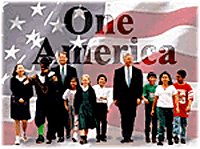 |
 |
 |
 |
I. Demographic Presentation
Presenter: Dr. Reynolds Farley
Vice President, Russell Sage Foundation, New YorkPresentation Highlights: Dr. Farley described the demographic trends now changing the nation's racial composition. He pointed out that current birth and death rates lead to slow growth for the non-Hispanic white and non-Hispanic African-American populations, but continuation of current levels of immigration and higher fertility rates lead to rapid growth for Hispanic and Asian/Pacific Islander populations. He presented projections that the Hispanic population will likely become the largest minority group shortly after the turn of the century. Non-Hispanic whites likely decline as a share of the total population to a little more than 50% by about 2050. The African-American population will neither increase or decrease and will likely make up about 12% of the total population.
Dr. Farley's Presentation II. Presentation on Attitudes Concerning Race (Polling)
Presenter: Dr. Lawrence Bobo
Professor of Sociology and African-American Studies,
Harvard University, Cambridge, MAPresentation Highlights: "What We Think About Race"
Dr. Bobo demonstrated major patterns in racial attitudes in the United States by discussing 1) the consensus on principles of racial equality and integration; 2) the complexity of moving from principles to practice; 3) Americans' views on the prevalence of discrimination and causes of racial inequality; 4) the problem of persistent stereotypes; and 5) the problem of Black cynicism and alienation. His conclusions included the bad news, which is the gulf in perceptions and the difficulty of effective discourse that results; the good news, which is the consensus on principles, rising openness to integration beyond token levels, and each group's interests are not seen as irreconcilable; a final comment on attitudes and behaviors (i.e., interpersonal interactions; larger social trends).
Dr. Bobo's Presentation III. Presentations on Attitudes Concerning Race (Psychological Perspective)
A. Presenter: Dr. James Jones
Professor of Psychology, University of Delaware
Director, Minority Fellowship Program, American Psychological AssociationPresentation Highlights: "The Embedded Nature of 'Race' Requires a Focused Effort to Remove the Obstacles to a United America"
Dr. Jones stated that America must confront the issue of race. He asserted that race can be a divisive concept and has been used to categorize people along a value-based continuum, which is usually based on faulty analysis and self-interested motives. Consequently, he concluded that a national conversation on race will be difficult, but ignoring it is not an option.
Dr. Jones' Presentation
B. Presenter: Dr. John Dovidio
Professor of Psychology, Colgate UniversityPresentation Highlights: "Understanding Contemporary Racism: Causes, Consequences, Challenges"
Over the past 35 years, the United States has addressed overt forms of racism through its laws and mores. Dr. Dovidio asserted that subtle forms of racism persist, which contribute to distrust and tension between the races because they are often unintentionally expressed. Furthermore, Dovidio alleged that in its contemporary form, it is difficult to prove racism as the determining factor for any particular action. He argued that people may not be aware of their own racial bias because of its subtlety. Nevertheless, according to Dovidio, minorities may attribute intentionality to these unintended and unconscious biases. His effective approach to race relations is the acknowledgment of the existence of alternative, potentially competing perceptions and experiences; understanding of the different perspectives; and the motivation to overcome real and perceived barriers to true equality.
Dr. Dovidio's Presentation
C. Presenter: Dr. Derald Wing Sue
Professor of Psychology, California School of Professional Psychology-Alameda
Professor of Psychology, California State University, Hayward
Presentation Highlights: "Creating Conditions for a Constructive Dialogue on 'Race': Toward Equal Access and Opportunities"
Dr. Sue asserted that a national dialogue on race will succeed only if Americans are able to put aside our biases and differences; be open and honest with one another; hear the hopes, fears and concerns of each other; recognize how prejudice and discrimination hurts everyone; and seek common solutions that allow equal access and opportunity.
Dr. Sue's Presentation
Advisory Board Meeting Transcript
